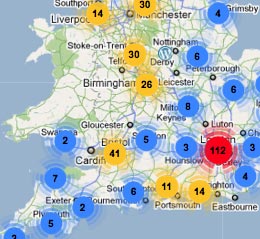Underlying digital revenues from newspaper websites owned by the Daily Mail and General Trust (DMGT) increased by 54 per cent in the year ending October, due to the “growing success of its primary website, Mail Online” according to the group’s preliminary results published today.
According to the published reports, circulation revenues at the group’s Associated Newspapers titles, which includes the Daily Mail, the Mail on Sunday and Metro, fell by an underlying two per cent while underlying advertising revenues were up seven per cent, said to have been driven by a “strong performance” from Metro.
Both the Daily Mail and Metro recorded their highest ever operating profit, the report adds.
DMGT’s regional arm Northcliffe recorded several declines, with underlying revenues down £16 million (six per cent), reported revenues have dropped by 8 per cent and advertising revenues were also down by 7 per cent.
Northcliffe: facing another tough year; UK advertising revenue in the first seven weeks down 7 per cent on last year, continuing year‐on‐year trend experienced in September (like‐for‐like decline of 8 per cent). Outlook for first quarter not expected to improve on this trend; will also be affected by higher newsprint costs; focus remains on reducing costs and new revenue opportunities.
Note: Underlying revenues are those adjusted for acquisitions and disposals made in the current and prior year.
 Using data from
Using data from